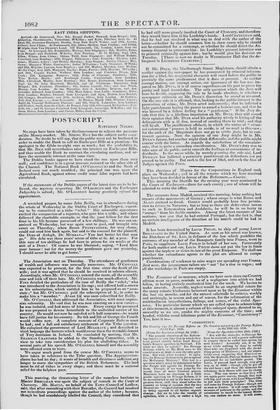If Mr. DYER, the Marlborough Street Magistrate, should obtain a
verdict against the newspaper he has prosecuted by criminal informa- tion for a libel, his magisterial character will stand before the public in precisely the same predicament that it does at present. As neither corrupt motive, nor corrupt action, nor ignorance of the law was im- puted to Mr. Dvrn, it is of course superfluous on his part to prove his purity and legal knowledge. The only question which the Jery will have to decide, supposing the rule to be made absolute, is whether a newspaper criticism on Mr. DYER'S discretion be sound or unsound. On the one side it is affirmed, that, looking to the public interest in the prevention of crime, Mr. DYER acted indiscreetly ; that lie inflicted a light punishment having the power to award a heavier one„ and that he was biassed by a fellow feeling for a "gentleman." If the Jury de- cide that this is a libellous imputation on Mr. DYER, they will record their opinion that Mr. DYER used his authority wisely in letting off the delinquents with a 51. fine, instead of sending them to trial; and that will be all. The justificatory affidavit, in which the virtue of " crimi- nal information" process is held to reside, is of no avail in this case; for the oath of the Magistrate does not go to settle Acts, but to con- trovert opinions. Now the opinion of one Jury might be in Mr. DYER'S favour, but another might think differently, and the public might concur with the latter. As regards the satisfaction of the complain- ants, that is quite a secondary consideration. Mr. DYER'S duty was to take care of the public, not to consult the feelings or convenience of in- dividuals. In the mean while, by merely granting the rttle nisi, Lord DF.NMAN has inflicted a pecuniary punishment on defendants not yet proved to be guilty. But such is the law of libel, and such the bias of Judges against the Press.


























 Previous page
Previous page